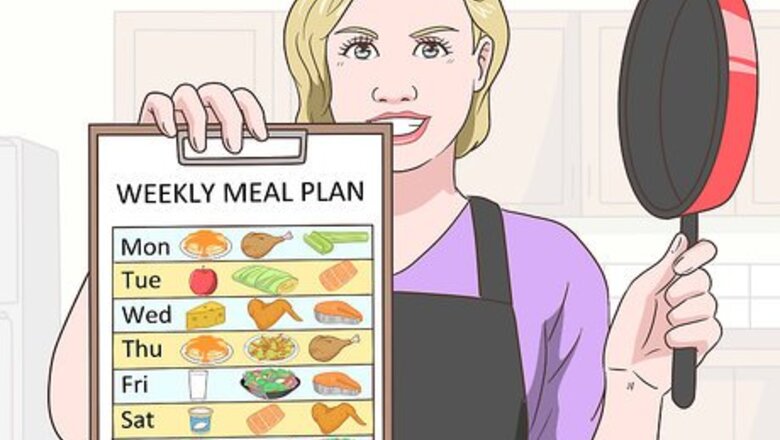
views
Maintaining a Healthy, Balanced Diet
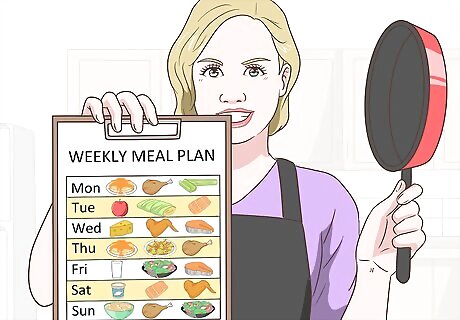
Create a weekly meal plan and cook at home as much as you can. Start by determining what meals you are going to prepare at home for the week. Make sure you cover breakfast, lunch, and dinner, as well as snacks. Draw up a grocery list and then go shopping for food at the beginning of the week so you have ingredients on hand to make meals. Look up healthy recipes online or in a cookbook so you can integrate them into your meals. Opt for cooking at home most days of the week so you can have healthy, nutrient rich meals. When you do eat out, opt for the healthy items on the menu. Try to follow the same diet you cook at home when you dine out.
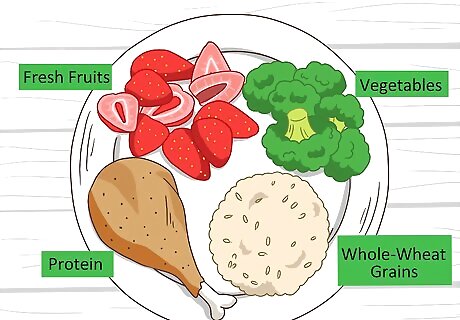
Load up on fresh fruits, vegetables, and grains. Make sure your meals are high in fresh fruits and vegetables as well as whole-wheat grains. Opt for healthy sources of protein like chicken, fish, and tofu. Add herbs and spices to your meals to give them flavor without adding calories.
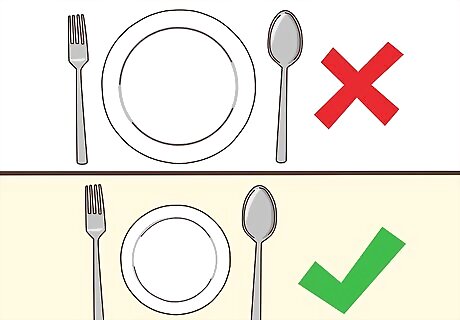
Have small portion sizes at each meal. Control your portions so you do not eat more than your body needs. Use smaller plates or bowls for your meals and have a little at a time so you can eat until you feel full or satisfied. Prepare vegetables or fruits first and then add protein or grains to the pot so your meals are balanced. Avoid eating out of large containers, bags, or bowls, as this can increase your portion sizes. Take small bites of your food and chew it slowly so you can savor your food.
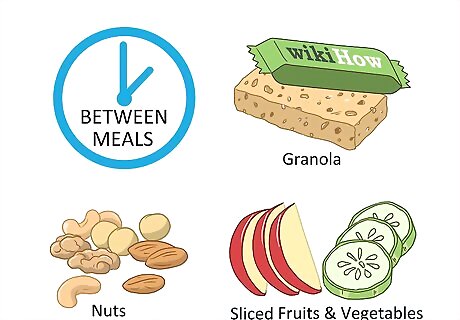
Go for healthy snacks between meals. Opt for healthy snacks like nuts, granola, or sliced fruits and vegetables. Pack healthy snacks in your bag so you can have them when you are on the go. Make sure you snack between meals so you do not become too hungry and eat too much at meal time.
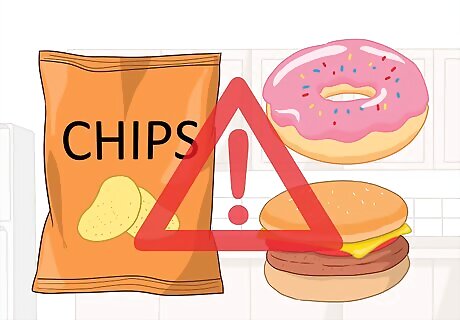
Avoid foods high in fat, sugar, and salt. Foods that are prepackaged or processed are usually low in nutrients and high in empty calories. Limit your intake of fast food to once a month so you maintain a healthy diet. Avoid unhealthy snacks like chips, cookies, cake, or fried foods. Do not keep them in the house or in your bag so you are not tempted to eat them. Stop eating foods that are high in trans fat, like donuts, cakes, frozen pizzas, and fast foods. Try to eat less than 2.3 grams (2,300 mg) of sodium every day. Eating too much sodium can cause you to retain fluids and gain weight.
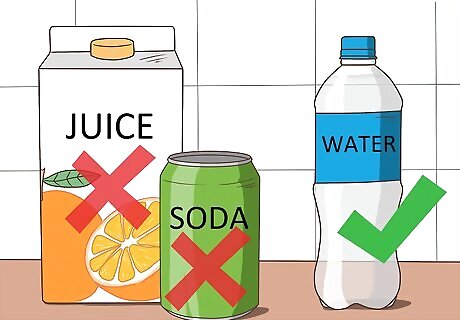
Drink water instead of sugary sodas and juices. Water won't have all the calories that sodas and juices have, and it will keep you hydrated. Drinking water every day with your meals can also make you more full so you don't consume as many calories.
Staying Active and Relaxed
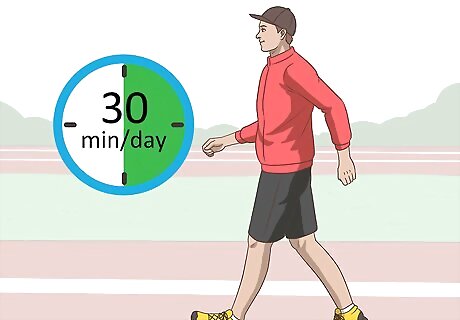
Get at least 30 minutes of physical activity a day. Staying physically active, combined with a healthy diet, can help you avoid gaining weight while on Lyrica. Though you may find it difficult to do a lot of physical activity due to your medical condition, make an effort to do a small amount every day. Going for a brisk walk for 30 minutes once a day or doing a low-impact workout class at your gym can keep those extra pounds off. You may enlist a friend to go walking with you or attend a workout class together so you are motivated to stay fit. Keep track of how often you exercise in a journal or app so you know you're getting at least 30 minutes of exercise a day.
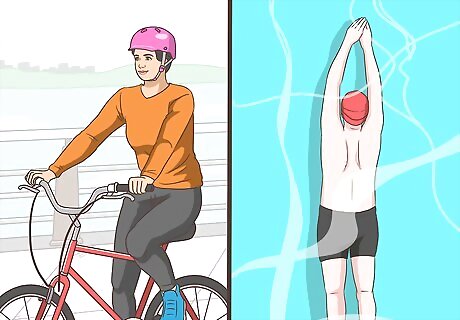
Take up cycling or swimming for a low impact workout. Cycling on a stationary bike or a regular bike is a great workout that is easy on your joints and muscles. Swimming is also great if you do not want to have to put too much stress on your body when you exercise. Take a cycling class at your local gym or invest in a good bike and go for long rides outside. Swim at a local pool at the gym or a community center.
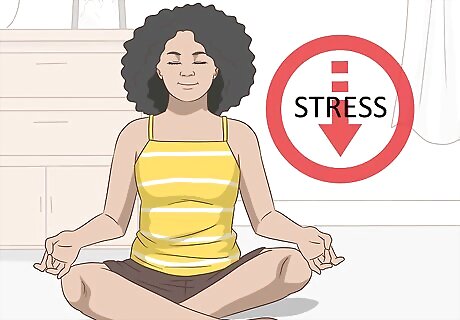
Try yoga or deep breathing to reduce your stress levels. High stress levels can cause you to emotionally eat and avoid staying active, leading to weight gain. Managing your stress in a healthy way with yoga or deep breathing exercises can help you stay healthy while on Lyrica. Take up yoga at a local yoga studio or your gym. You can also try doing yoga at home by following online tutorials or instructor-led videos. Do deep breathing in the morning before you start your day or during your lunch break. Find a quiet, private spot and sit in a comfortable position. Inhale for a count of 5 through your nose and exhale through your nose for a count of 5. Do this for 1-3 minutes until you feel calm.
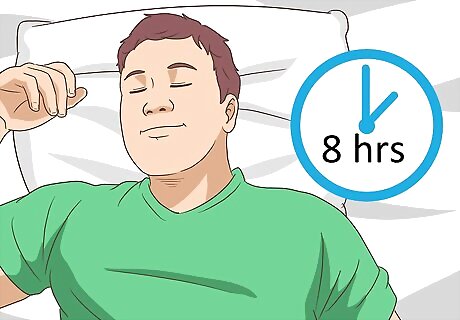
Get at least 8 hours of sleep a night. Being well rested can help you manage your appetite and ensure you stay healthy while on Lyrica. Aim to get at least 8 hours of quality sleep a night. Make your bedroom cool, dark, quiet, and comfortable. Have a pre-bed ritual where you do something relaxing like read a book or listen to music. Avoid bright lights or screens right before bed so you get a better night's rest. Try to follow a sleep schedule where you go to bed at the same time every day and wake up at the same time every morning. This will help your body fall into a regular sleep pattern and ensure you get quality sleep each night.
Talking to Your Doctor
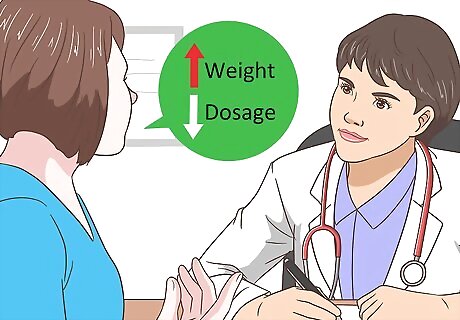
Speak to your doctor about lowering your dosage of Lyrica. If you notice you’ve gained 10 to 20 pounds (4.5 to 9.1 kg) within the first several months on the medication, you may need try taking a lower dosage. Taking a dose that is low and effective means there will be less of the drug cycling through your body, leading to less side effects. Work with your doctor to find a dosage that is low enough to meet your medical needs so you do not gain a lot of weight. Never go off of Lyrica completely without the approval of your doctor, as this can lead to other serious medical issues and side effects.
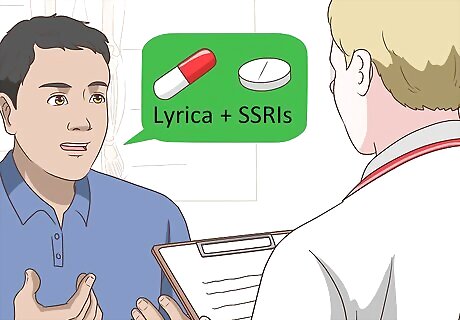
Talk to your doctor about other medication you are on that may cause weight gain. If you are taking other medications in addition to Lyrica like SSRIs or antipsychotics, you may be more prone to gaining weight. Speak to your doctor about adjusting your dosage of these drugs, or going off of some of them as needed, to help control your weight. Some medications, like stimulatory drugs, can help to counterbalance weight gain you may experience on Lyrica. Your doctor may recommend you take these to help reduce your weight while you are on Lyrica.

Ask your doctor about switching to a different medication. If you feel your weight gain is causing other health issues that outweigh the benefits of Lyrica, you may decide to go off of the drug. Your doctor will have you ease off the drug a little at a time so you do not experience withdrawal. They may then suggest you take other medications to address your medical issues without having to worry about gaining a lot of weight. Keep in mind that, in some cases, Lyrica may be the best option for treating certain issues, such as fibromyalgia. You may try making diet and lifestyle changes while on the drug so you can benefit from it without gaining too much weight.




















Comments
0 comment